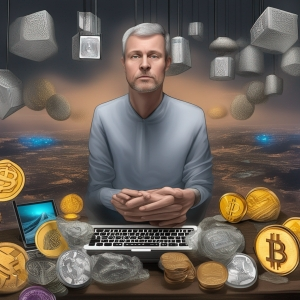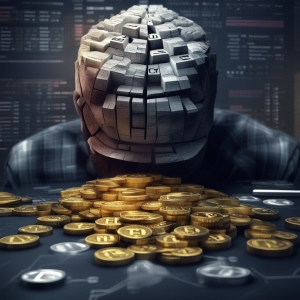Table of Contents:
When it comes to the volatile world of cryptocurrency trading, having a solid mental game can be just as important as having a sound financial strategy. The intense fluctuations in crypto value can easily cause panic or conversely, overconfidence. Success in this field rests heavily on a trader’s ability to remain poised and clear-headed, no matter what the market does. This article will delve into the mental game of trading, providing insights and strategies to help traders master their emotions and execute their trading plans with discipline and patience.
Understanding the Mental Game of Trading
The mental game of trading simply refers to the emotional and psychological aspects that influence a trader's decision-making process. To manage this effectively, you must first understand that trading is not purely about numbers and analysis. It also involves your personal reactions, emotions, and mental resilience. After all, it is human psychology that drives the market trends.
Some key psychological phenomena that impact trading include fear, greed, regret, and overconfidence. The fear of losing can make a trader sell too early, while greed might push someone to hold onto an asset for too long, hoping for greater returns. Regret, on the other hand, can make one dwell on past mistakes, hindering their ability to make sound decisions for future trades. Overconfidence can lead a trader to take on risks without proper evaluation.
To succeed, you must learn to recognize these emotional responses, understand how they influence your trading decisions, and construct strategies to manage them effectively.
The Psychology of Crypto Trading: Key Factors Impacting Our Emotional State
When venturing into the world of cryptocurrency trading, we are typically met with three key psychological factors: uncertainty, volatility, and unpredictability. These three elements combined can stir havoc in a trader's emotional state, and hence his or her decision-making.
Uncertainty is part and parcel of any financial market, and it generates fear and anxiety. Crypto markets, despite their decentralised nature, are not immune. The lack of central authority provides room for speculation, which leads to uncertainty. As a trader, you must learn to accept that uncertainty is an integral part of trading and should not deter you from your long-term plans.
The volatility of crypto markets is another emotional trigger. Unprecedented price swings can provoke both excitement and fear. Being aware of this emotional response is crucial to adapt and not let it govern your trading decisions. The key is to stay rational and stick to your own strategy, even if others are panic buying or selling.
The unpredictability of crypto markets often results in decision paralysis. It's impossible to predict accurately and consistently how the market will move. Yet, making timely decisions is imperative for profitability. To manage this, focus less on market predictions and more on risk management, strengthening your mental agility to make sound decisions amidst the unknown.
Pros and Cons of Staying Calm While Crypto Trading
| Pros | Cons |
|---|---|
| Improved decision making under stress | May lead to indecisiveness from over calculation |
| Lower risk of emotional trading | Potential loss of quick response in volatile market |
| Better long-term strategies with stable mind | Possible loss of competitive edge due to calmness |
| Less prone to market manipulation | Might be seen as lack of passion or drive |
Unpacking Fear and Greed: Crypto Trading's Biggest Emotional Triggers

The swirl of emotions that come into play while trading cryptocurrencies is wide and varied, but there are two prominent feelings that rule the roost- fear and greed. These emotions are tied to our primal instincts of survival and can heavily influence trading decisions.
Fear manifests itself in the form of panic selling. When prices start to dip, the fear of losing all investment prompts a quick sell, often leading to a sizable loss. This reaction stands in stark contrast to a calm, measured approach based on careful analysis and predefined trading strategies. Finding balance and not giving in to knee-jerk reactions is key when dealing with fear.
Greed, on the other hand, can lead to the so-called "fear of missing out" or FOMO. Crypto prices can surge rapidly, fueling a rush to buy in hopes of making a quick profit. However, sky-rocketing prices can just as easily plummet, leaving the tardy investor holding worthless tokens. Here too, it's important to stick to a well-thought-out trading plan instead of being swept up in the tide of rampant speculation and FOMO.
Understanding and learning to control these emotional triggers is a crucial part of the mental game of trading. Successful traders are able to detach their emotions during trading, make rational decisions based on market realities instead of fear or greed.
Strategies for Staying Calm Under Pressure: Crypto Trading Edition
Mastering the mental game of trading boils down to effective emotional management. Here we explore the key strategies for maintaining poise under pressure:
Have a clear trading plan: Having a well-crafted plan and sticking to it can help keep emotions at bay. It provides a roadmap that guides your actions and helps you maintain objectivity, especially during market turbulence.
Practice Risk Management: Risk management is crucial to weather the crypto storms. Set stop-loss orders, diversify your portfolio, and never invest more than you can afford to lose. This drives the point home that not every trade needs to be profitable, and losses are part and parcel of the trading world.
Stay Informed: Knowledge is power. Informed trading decisions happen when you keep yourself up-to-date with market trends, news and other relevant information. This not only helps you make better trade decisions, it also builds confidence which in turn reduces anxiety.
Take Regular Breaks: Trading can be stressful and exhausting. Don't succumb to emotional fatigue. Taking a break, refreshing your mind, even sleeping on your decisions can sometimes be the best approach.
Meditation and Exercise: This might seem off track, but stress management techniques such as meditation, deep-breathing exercises, or even hitting the gym can profoundly improve mental toughness.
Mental Rehearsal: By mentally rehearsing different trading scenarios, you can prepare yourself for the actual trades and the emotional reactions that might follow. This aids in developing emotional control and reaction speed when those scenarios occur.
Find a Trading Community: Joining a community of traders can provide social support, provide different perspectives and reduce the feeling of isolation during tough market times. Remember, everyone is riding the same roller coaster.
While no strategy can guarantee profits, these practices arm traders with emotional resilience necessary to navigate the turbulent seas of cryptocurrency trading.
Mindfulness and Crypto Trading: Unlocking Inner Calm in a Volatile Market

On the quest to conquer the mental game of trading, the practice of mindfulness can become a potent tool. At its core, mindfulness encourages clear thinking by achieving mental tranquility, something that the often tumultuous crypto market demands in high doses.
Mindfulness is the art of staying focused on the present moment. When trading in the volatile crypto market, it's easy for the mind to wander into the 'what-ifs' of the past and future - what if I had sold it then, what if the value drops after I buy, etc. Such constant mental chatter can increase stress levels and cloud judgement, leading to rash decisions.
Through mindfulness, you can learn to address such distractions objectively without emotional entanglement, thereby reducing their potency to affect your decision-making ability. Mindfulness helps in experiencing emotions without reacting impulsively, enabling you to respond to market changes with measured calm.
Practices such as regular meditation, deep-breathing exercises, or even a simple routine of taking a few quiet moments to ground oneself before starting the trading day can all help towards achieving this state of mindfulness. Remember, calm minds breed calm decisions, and in crypto trading, this can make all the difference between success and failure.
Conclusion: The Future of Trading is in the Mind
The rapidly evolving crypto market often tests the nerves of even the most seasoned traders. Its volatile nature, marked by wild price swings, can elicit intense emotional responses. To remain level-headed amid the tumult, it's paramount that traders continually hone their mental game. Recognizing and understanding one's emotional triggers, while simultaneously developing strategies to check them, becomes crucial to sustained success in this unpredictable realm of crypto trading.
At its core, the mental game of trading is an exercise in self-awareness and discipline. By understanding ourselves better and regularly examining our emotional responses, we can take the first crucial steps towards becoming more resilient traders. The future of trading, therefore, lies not only in our ability to read and analyze the market but also in our ability to manage and master our own minds.
Becoming a successful trader is a journey that goes well beyond financial literacy. It's about cultivating mental toughness, staying patient, and developing a measured response to market fluctuations. Undoubtedly, the future of trading, especially in the crypto space, belongs to those who can keep a calm mind amid the market's storm.
FAQ: The Psychology of Crypto Trading

How Can I Manage Stress In Crypto Trading?
Establishing a sound trading strategy, setting realistic expectations and practicing mindfulness techniques can all help to manage stress in crypto trading.
Why Is Mindset Important In Crypto Trading?
A positive and disciplined mindset can help maintain focus and navigate through the ups and downs of crypto trading, enabling better decision making.
How Can Losses Impact A Trader's Mindset?
Losses can lead to emotional reactions such as fear and panic. It's important to have strategies to manage these reactions and make decisions based on logic, rather than emotion.
What Strategies Can I Use To Stay Calm In Stressful Trading Situations?
Techniques such as mindfulness, meditation, regular exercise and ensuring sufficient rest can help manage stress levels and maintain a calm mindset in trading situations.
How Can I Prevent Overtrading?
Overtrading can be prevented by setting clear trading goals, sticking to a trading plan, and avoiding impulsive decisions based on emotional reactions to market fluctuations.












